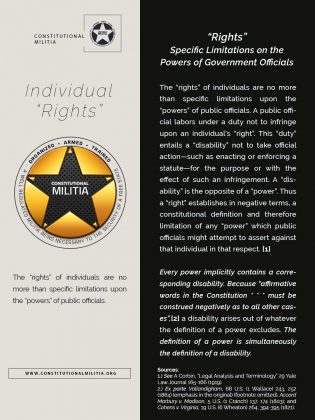Last Updated on August 20, 2022 by Constitutional Militia
Delegated powers are, in the nature of things, limited powers. For instance, a grant of “all legislative power” or “all judicial power” is limited to such power as is “legislative” or “judicial” in character. Even a grant of “all power” is limited to the power the grantor actually enjoys the privilege to delegate. For that reason, the very existence of the Constitution establishes that the powers the General Government are not only delegated, but also definite, and limited by their very definition[1]—and can extend only to those powers WE THE PEOPLE have the competence to grant. For example, inasmuch as “tyranny” is a set of powers—including, for instance, the power to wantonly kill innocent human beings—that no one may claim a right to exercise, even WE THE PEOPLE could not delegate tyrannical powers to their government.[2] And the Supreme Court has recognized as much:
“There are . . . rights in every free government beyond the control of the State . . . there are limitations on [governmental power] which grow out of the essential nature of all free governments. Implied reservations of individual rights, without which the social compact could not exist. . . .”[3]
Therefore the Constitution contains no undefined and general powers, that some theoretical government might possess[4]—or a fortiori that some actual foreign governments happen to exercise. Neither could it contain any independent and unmentioned power[s]”—for that would “conflict with the doctrine that this is a government of enumerated powers”.[5] Instead, the General Government’s every claim of power must find direct support in a constitutional grant, “in terms or by necessary implication.”[6] And “the burden of establishing a delegation power to the United States . . . is upon those making the claim.”[7]






























